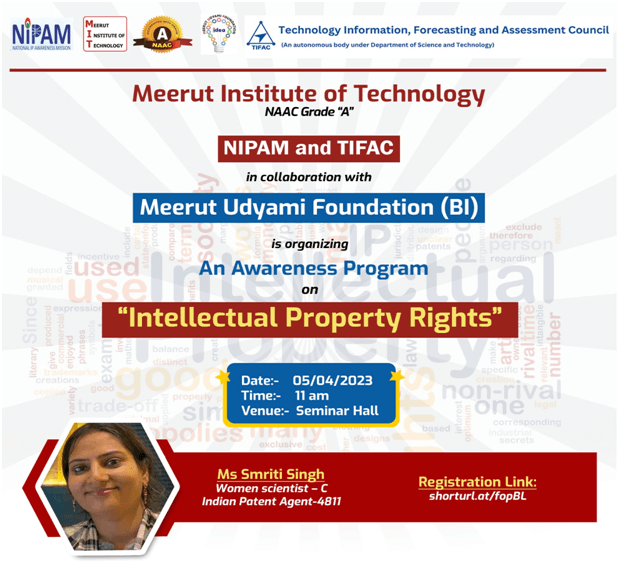Awareness Program on Intellectual Property Rights
- Introduction:
Meerut Institute of Technology, in collaboration with National Intellectual Property Management (NIPAM), Technology Information, Forecasting and Assessment Council (TIFAC) and Meerut Udyami Foundation (BI), organized an awareness program on “Intellectual Property Rights” (IPR). The program aimed to educate students, faculty members and aspiring entrepreneurs about the significance of intellectual property (IP) protection, its role in fostering innovation and the process of securing and managing intellectual property rights..
2. Participants: The awareness program attracted participants from various segments, including:
(1) Students and faculty members of Meerut Institute of Technology
(2) Entrepreneurs, innovators and startup enthusiasts associated with Meerut Udyami Foundation (BI)
(3) Representatives from NIPAM and TIFAC involved in IP management and policy development
(4) Industry professionals, researchers and legal experts with an interest in intellectual property rights
3. Program Highlights: The awareness program on Intellectual Property Rights featured a series of informative sessions and interactive activities:
(1) Expert Talks: Renowned experts in the field of intellectual property rights delivered talks on various aspects of IP protection, including patents, trademarks, copyrights and trade secrets. Speakers shared insights into the importance of IP in innovation-driven economies and highlighted the benefits of securing intellectual property rights for individuals and businesses.
(2) Case Studies: Real-life case studies and success stories of IP protection and commercialization were presented to illustrate the practical implications of intellectual property rights. Participants learned about the experiences of innovators and entrepreneurs who effectively leveraged IP for business growth and competitive advantage.
(3) Workshops and Training Sessions: Hands-on workshops and training sessions were conducted to provide participants with practical guidance on IP registration, documentation and enforcement. Participants had the opportunity to learn about the process of filing patent applications, drafting trademark specifications and conducting patent searches.
(4) Interactive Q&A Sessions: Interactive question-and-answer sessions allowed participants to seek clarification on IP-related concepts, legal procedures and best practices. Experts addressed queries raised by participants and provided personalized guidance on IP strategies and challenges.
4. Outcomes and Impact:
- Increased awareness and understanding among participants about the importance of intellectual property rights in innovation and entrepreneurship.
- Empowerment of students, faculty members and entrepreneurs with knowledge and skills to protect their intellectual assets and navigate the complexities of IP laws and regulations.
- Strengthening of partnerships between academic institutions, government agencies and industry stakeholders in promoting IP education, awareness and advocacy.
- Inspiration and motivation for individuals to harness the potential of intellectual property for economic growth, technology transfer and social innovation.
- Establishment of a platform for ongoing collaboration and engagement on IP-related initiatives, including capacity building, policy advocacy and knowledge sharing.
5. Conclusion:
The awareness program on Intellectual Property Rights organized by Meerut Institute of Technology, NIPAM, TIFAC and Meerut Udyami Foundation (BI) was instrumental in fostering awareness, education and advocacy on IP-related issues. By equipping participants with knowledge and resources to protect and leverage their intellectual assets, the program contributes to promoting innovation, entrepreneurship and economic development in the region.
